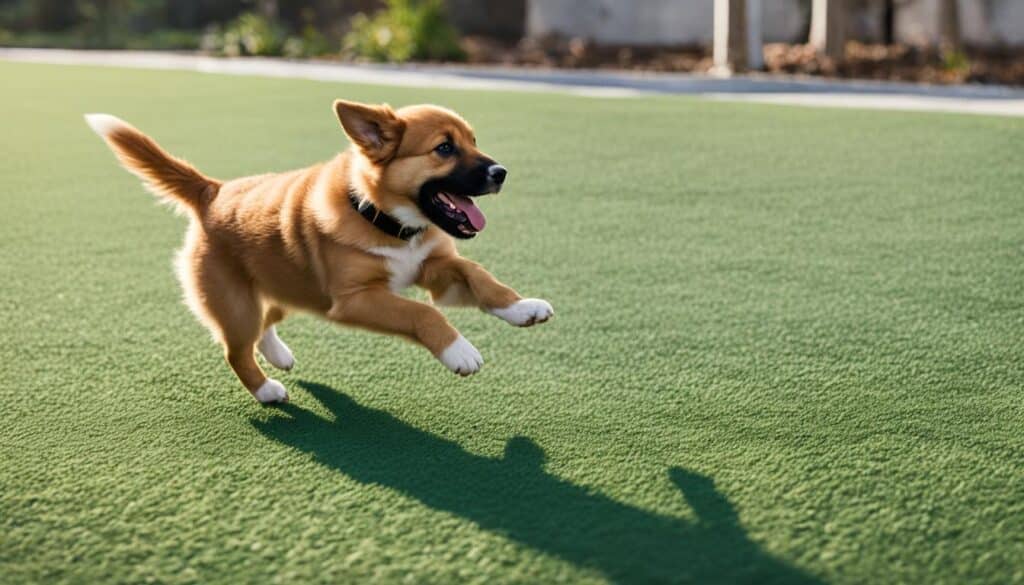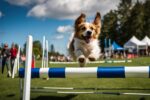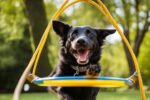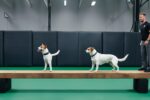Puppy Socialization: Key to a Well-Behaved Dog

Proper puppy socialization is essential for raising a well-behaved dog. Early training and positive dog interaction during the critical developmental stages are crucial for shaping a dog’s behavior and temperament. The first three months of a puppy’s life and the subsequent three to six months are key periods for socialization, as dogs are most receptive to learning and forming positive associations.
During these crucial socialization periods, puppies can develop confidence, become less fearful or aggressive, and adapt well to new experiences. One effective way to socialize your young pup is by enrolling them in a daycare enrichment program. This program provides opportunities for supervised interactions with other puppies, allowing them to learn appropriate dog socialization skills and build confidence in a controlled environment.
By focusing on puppy socialization and early training, you can lay a solid foundation for your dog’s future behavior and ensure they grow up to be well-adjusted, confident, and obedient companions.
Benefits of Socialization
Socializing your dog has numerous benefits. Well-socialized dogs have increased confidence, better behavior, and improved health. They are less fearful and anxious, reducing the risk of aggression and dangerous behaviors.
One of the key benefits of socialization is increased safety. Well-socialized dogs are less likely to become aggressive or run away, making them less of a risk to themselves and others. This increased safety extends to various situations, such as encounters with strangers, other dogs, or new environments.
Socialization also plays a crucial role in ensuring outings with your dog are enjoyable for both of you. A dog who is comfortable and well-adjusted in various settings will be more relaxed, allowing you to explore new places and activities together without stress or anxiety.
By investing time and effort into socializing your dog, you can create a strong foundation for their behavior and well-being. Improved behavior and increased safety are just two of the many benefits that come from a well-socialized dog.
Improved Behavior and Increased Safety
“Well-socialized dogs are more likely to have positive interactions with other dogs, reducing the risk of aggression or fights. They are also less likely to exhibit destructive behaviors or anxiety-related issues when faced with new experiences or changes in their environment.” – Dr. Emily Watson, Canine Behavior Specialist
When dogs are properly socialized from a young age, they learn how to interact with other dogs and people in a safe and appropriate manner. This helps prevent the development of aggression, fear, or anxiety-related behaviors. Socialization can have long-lasting positive effects on a dog’s behavior, creating a calm and well-adjusted companion.
Increased safety is a crucial aspect of socialization. A dog who is comfortable in various situations is less likely to react aggressively out of fear or lash out in unfamiliar or stressful environments. This not only ensures the safety of those around the dog but also reduces the risk of injury or accidents.
Socialization Techniques
Proper socialization is essential for dogs to develop into well-rounded and behaviorally balanced companions. Through a combination of positive reinforcement training, controlled exposure, and supervised socialization, dogs can learn to navigate new environments, interact with other dogs and people, and become confident in various situations.
Positive Reinforcement Training
Positive reinforcement training is a highly effective technique that focuses on rewarding desired behaviors rather than punishing undesirable ones. Through the use of treats, praise, and playtime, dogs are motivated and encouraged to repeat behaviors that are positively reinforced. By associating good behavior with positive rewards, dogs learn to make favorable choices, becoming well-behaved and responsive.
Controlled Exposure
Controlled exposure involves gradually introducing dogs to new environments, stimuli, and experiences in a structured manner. This technique allows dogs to become familiar with different sights, sounds, and smells at a pace that they feel comfortable with. By slowly exposing them to new situations and providing positive associations, dogs gain confidence and learn to adapt to new circumstances without fear or anxiety.
Supervised Socialization
Supervised socialization plays a vital role in helping dogs develop appropriate social skills and behaviors. By carefully monitoring and guiding interactions with other dogs and people, pet owners can ensure that their dogs engage in positive and safe social experiences. This technique allows dogs to learn appropriate play behavior, communication cues, and boundaries, promoting harmonious interactions and preventing the development of aggression or fear-based responses.

Implementing these socialization techniques from an early age is crucial to shaping a dog’s behavior and temperament positively. By using positive reinforcement training, controlled exposure, and supervised socialization, pet owners can help their dogs become confident, well-adjusted, and socially adept companions.
Common Socialization Challenges
Socializing a puppy can have its fair share of challenges. Understanding and addressing these challenges is essential for effective socialization. Some common challenges include fear, aggression, and negative experiences, which can hinder the socialization process.
Fear: Fearful behaviors in puppies can manifest in various ways, such as trembling, hiding, growling, or even biting. When faced with unfamiliar situations or stimuli, puppies may become frightened, making it difficult for them to socialize positively.
Aggression: Aggression can occur when a puppy feels threatened or uncomfortable in social interactions. It is important to address aggression early on to prevent it from becoming a persistent issue in the dog’s behavior.
Negative Experiences: Puppies who have had negative experiences in the past, such as a lack of socialization as a young puppy or rescue from an abusive situation, may find socialization challenging. These negative experiences can affect their behavior and make them wary of new interactions.
Dealing with these challenges requires patience, understanding, and the assistance of a professional if needed. It is crucial to create a safe and controlled environment for socialization, gradually introducing the puppy to new experiences, people, and other animals. Consistent positive reinforcement and gentle exposure are key to helping puppies overcome their fears and develop positive associations.
“Socialization challenges, such as fear, aggression, and negative experiences, can hinder a puppy’s ability to develop positive interactions. With patience and professional guidance, these challenges can be overcome, ensuring a well-adjusted and socially confident dog.”
To further illustrate these challenges, here is a table summarizing the common socialization challenges and their effects:
| Challenge | Effects |
|---|---|
| Fear | Creates apprehension and avoidance behavior |
| Aggression | Poses a threat to safety and may lead to negative interactions |
| Negative Experiences | Leads to mistrust, fear, and potential behavioral issues |
By understanding and actively addressing these challenges, pet owners can navigate the socialization process better and help their puppies become well-adjusted and socially confident dogs.

The Importance of Professional Dog Daycare
For pet owners who are looking to provide their dogs with proper socialization, professional dog daycare is a valuable option. Daycare facilities offer a safe and supervised environment where dogs can interact with other dogs and people, promoting socialization and positive behavior.
In addition to socialization, dog daycare provides several other benefits. Dogs at daycare receive regular exercise, which helps maintain physical health and prevents obesity-related issues. Mental stimulation through interactive play and activities keeps their minds sharp and engaged. Moreover, the structured routine followed in daycare facilities helps dogs develop good habits and become well-adjusted.
Convenience is another advantage of professional dog daycare. Busy pet owners can rely on daycare services to ensure their dogs are well-cared for and entertained while they are at work or attending to other commitments. This can prevent separation anxiety and destructive behavior that may occur when dogs are left alone for long periods.
When choosing a daycare facility, it is essential to prioritize safety and cleanliness. Visit the facility beforehand to observe the environment and assess the staff’s expertise. Recommendations from other pet owners or veterinarians can also guide your decision. By opting for professional dog daycare, you can provide your furry friend with a supervised and enriching experience that fosters socialization, promotes good behavior, and enhances their overall well-being.
FAQ
Why is puppy socialization important?
Puppy socialization is crucial for a dog’s development, behavior, and temperament. It helps them become well-adjusted, confident, and less fearful or aggressive.
When is the best time to socialize a puppy?
The critical periods for socialization are the first three months of a dog’s life and the second socialization period from three to six months of age.
What is the benefit of socializing my dog?
Well-socialized dogs have increased confidence, better behavior, and improved health. They are less fearful and anxious, reducing the risk of aggression and dangerous behaviors.
How can I effectively socialize my dog?
Effective socialization techniques include positive reinforcement training, controlled exposure to new environments, and supervised socialization with other dogs and people.
What are some common socialization challenges?
Common challenges include fear, aggression, and negative experiences. It’s important to address these challenges early on and seek professional help if needed.
Why should I consider professional dog daycare for socialization?
Professional dog daycare provides a safe and supervised environment where dogs can interact with other dogs and people. It offers the benefits of socialization, regular exercise, mental stimulation, and a structured routine.
Source Links
- https://www.24hourdogdaycare.com/blog/socialization-the-key-to-a-confident-and-well-behaved-dog/
- https://felicitails.com/blogs/about-dog-training/puppy-socialization-setting-the-foundation-for-a-well-behaved-dog
- https://www.reddit.com/r/Dogtraining/comments/bcmwgh/to_those_with_well_behaved_dogs_how_do_you_do_it/






